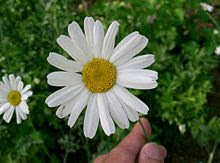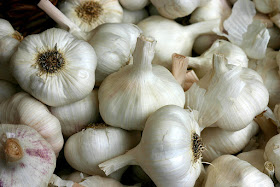This is a stunning example of disinformation and propaganda, and I'd like to just dissect each numbered claim for a broader understanding of why that is so.
Let's begin!
1. Boron
First of all, boron is an essential nutrient for plants and naturally occurs in soil. Like anything, it may be harmful in high doses or if misapplied, but organic farmers aren't just flinging this stuff around willy nilly. See here for an example of how it's used.
2. Acetic Acid
It's fucking vinegar. Do I really need to expound upon this one? Don't spray it in your eyes or on bees, for fucks sake.
3. Copper Sulfate
One of a few synthetic substances approved for use in organic farming, copper sulfate is definitely not being used indiscriminately due to copper's ability to build up in soil as well as being toxic in high amounts. No farmer is using this or any other input unless clearly needed, and there are steps that must be taken to minimize risk. Soil testing is required when using copper, for example. As far as being 'toxic to everything' - that is highly misleading, since while copper can be toxic in the wrong amount it is also an essential nutrient for plants, animals and humans. This is definitely not a first resort tool in crop production due to the important balance that must be kept. It is also permitted in conventional agriculture right along with all other organic approved substances, lest we forget.
4. Pyrethrins
Pyrethrins are a naturally occurring insecticidal compound found in chrysanthemum flowers. This is not to be confused with pyrethroids, a synthetic analog of pyrethrins. According to NPIC, "Pyrethrins are practically non-toxic to birds but highly toxic to honey bees. However, some of the risk to pollinators is limited by their slight repellent activity and rapid breakdown." Clearly, pyrethrins need to be used with care and applied correctly so that they do not harm bees. Neurotoxicity can be a concern with occupational exposure, safety instructions need to be followed precisely. Any residues on food would be minimal, and easily washed off. Pyrethrins do not spread readily through a plant in the way neonicotinioids were designed to do.
5. Hydrogen Peroxide
Hydrogen peroxide (H2O2) is another substance approved for organic farming. It is allowed to be used as a disinfectant and for plant disease control. H2O2 breaks down readily into water and oxygen. Direct contact is highly toxic to bees, however as long as care is taken not to spray during active foraging times, and prevent drift, once residues have dried they are considered non-toxic. Proper care needs to be taken when handling concentrate, but again, once dry the application is considered harmless to human health.
6. Lime Sulfur
Lime sulfur is a modified form of elemental sulfur. Elemental sulfur is considered to be non-toxic to birds, aquatic organisms and honeybees. Sulfur is an essential macronutrient in crop production, it is allowed for use as a soil amendment, and for diseases, mites and insects in both the elemental and lime sulfur forms. High applications can reduce soil ph and thereby negatively effect earthworms, however the claim that it is 'extremely toxic to earthworms' is without merit. Clearly it is in the best interest of the farmer to protect soil from shifts in ph thereby protecting soil biology, including earthworms. Elemental sulfur is relatively harmless to humans, while lime sulfur is extremely caustic and must be handled properly when used in agriculture. Again, no one is flinging this shit around.
7. Rotenone
 |
| Source |
Not fucking used. Really.
Not even on fucking imported produce either.
8. Nicotine Sulphate
It's also fucking prohibited!
9. Azadirachtin
Another name for neem oil or neem oil soap, azadirachtin (misspelled on the meme as azidirachtin) is approved for use in organic farming. It is derived from Azadiracta indica, the neem tree. It has been used for hundreds of years for medicinal purposes, as a cosmetic and as a pesticide. Azadirachtin breaks down quickly, approximately 4-5 days. Thus it is not expected that it will accumulate, and is considered relatively safe to wildlife and adult beneficial insects. Like any insecticide, it should not be applied while bees are foraging. Some negative effects have been noted for larval stages of some insects, however I've found no evidence for the claim that it is 'responsible for mass bee deaths'. Positive effects have been found for earthworms exposed to neem. Overall, azadirachtin is considered to be an appropriate tool for pest management and is classified as relatively non toxic.
10. Methyl Bromide
Methyl bromide, a fumigant, is not approved for use in organic agriculture. It is allowed under very specific circumstances called 'critical use exemptions', one being strawberry starts. If organic growers cannot find organic strawberry starts they are allowed to purchase conventional, which have had methyl bromide soil treatment. Fortunately the United States largest organic strawberry producer, Driscoll's is making an effort to expand the availability of organic starts. In fact, the organic industry is leading the way in finding alternatives to methyl bromide which is indeed very damaging to the ozone layer. Other countries have managed to phase it out completely with no exemptions, hopefully the US will follow suit.
11. Wide range of homemade chemical concoctions
 |
| Not an organic farmer. |
NOT FUCKING ALLOWED
12. Citronella oil, eucalyptus oil, garlic extract
The Risk-Monger's claim here is simply 'bees'. So, I'm going to assume he means these are toxic to bees. I don't think it's fair to lump three separate substances together, two are horticultural oils and one is a food extract. But suffice it to say, many substances can have a harmful effect on bees. Garlic is an effective insecticide, so clearly you don't want to spray it or any pesticide at all, on beneficial insects. The non-profit Xerces Society has compiled information on minimizing risks to pollinators from organic approved pesticides. They classify garlic as non-toxic. Horticultural oils are classified as highly toxic, and are recommended to be used when bees are not active as they are only harmful on contact.
Any pesticides being used on organic farms are only after other control measures have failed. Pesticides are a last choice in an organic farming program. 'Preventive, cultural, mechanical, and physical methods must be first choice for pest control, and conditions for use of a biological material
must be documented in the organic system plan' according to the National Organic Program. Like I stated before, farmers are simply not flinging this shit around. Many organic farmers don't even use pesticides at all.
There are distinct benefits to organic farming, lower pesticide residues being one, and overall, organic is competitive with conventional farming practices, as well as surpassing in many areas.
 |
| Source |
No system of agriculture is perfect, and organic certainly has areas in which it can improve as does conventional.
However, the Risk-Monger's meme simply fear-mongers instead of educate on this topic. The claims range from misleading to outright false. The bits of truth have been veneered over a pile of lies and bullshit to make this information appear legitimate, but in reality it is just another example of garbage propaganda from industry lackeys promoted by Skeptics.
The accompanying article to this meme is much the same, making claims that are not true, backing claims with cherry picked quotations:
From sources that actually refute most of the claims they are making.
My advice? Seek another source other than the Risk-Monger for credible information on agriculture.
However, the Risk-Monger's meme simply fear-mongers instead of educate on this topic. The claims range from misleading to outright false. The bits of truth have been veneered over a pile of lies and bullshit to make this information appear legitimate, but in reality it is just another example of garbage propaganda from industry lackeys promoted by Skeptics.
The accompanying article to this meme is much the same, making claims that are not true, backing claims with cherry picked quotations:
From sources that actually refute most of the claims they are making.
My advice? Seek another source other than the Risk-Monger for credible information on agriculture.















No comments:
Post a Comment